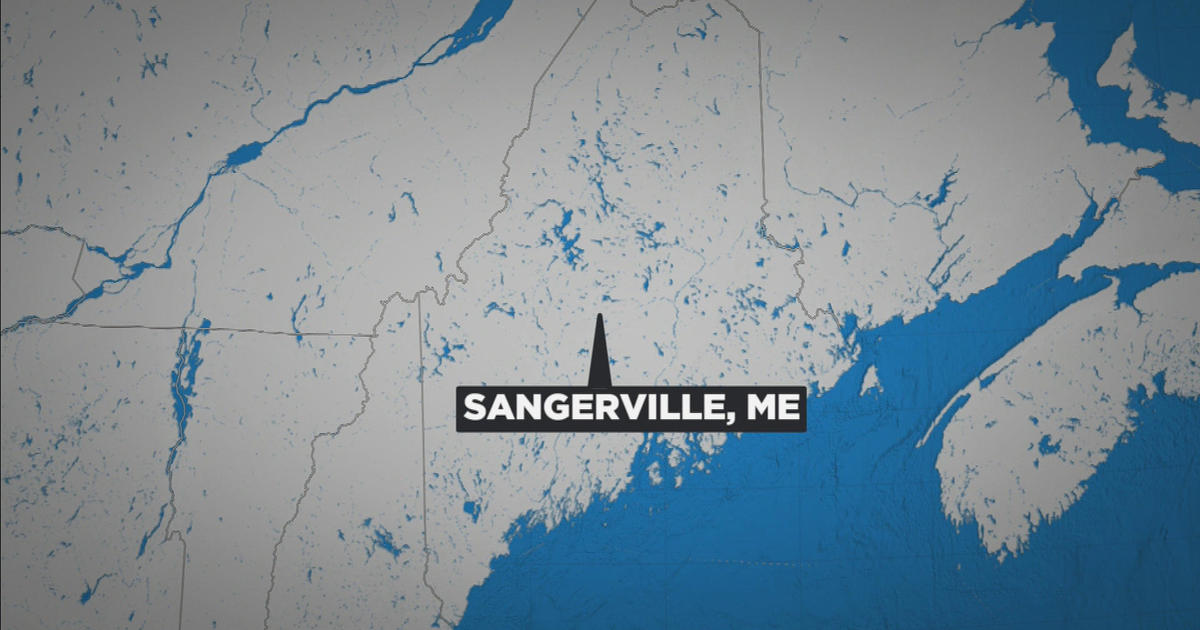Politics
Nonprofit launches to restore ICE immigration enforcement, counter left-wing ‘Abolish’ movement
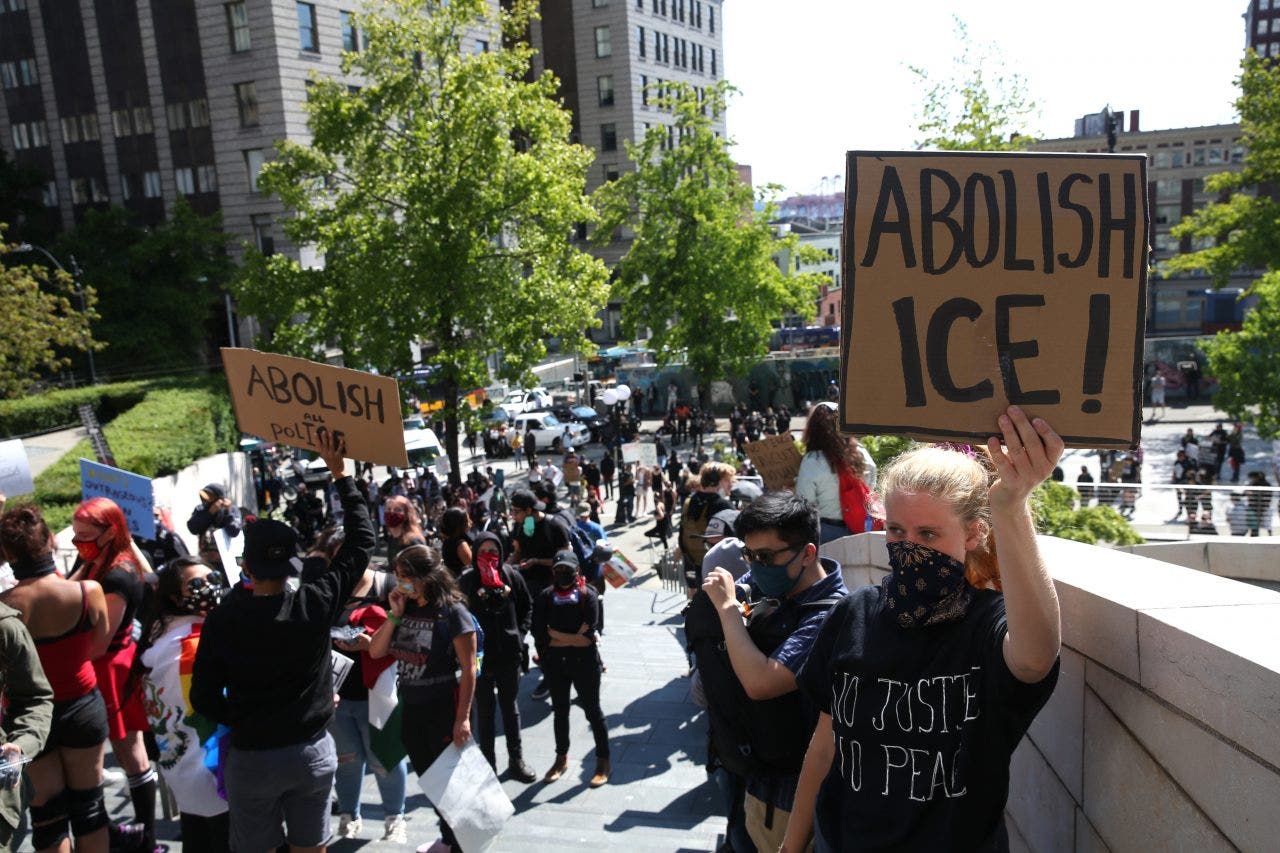
A new nonprofit launching Monday intends to push back against the “Abolish ICE” movement and what it says is the “vilification” of Immigration and Customs Enforcement’s (ICE) mission and its agents in recent years – while pushing for stricter interior immigration enforcement and the end of “sanctuary” cities.
The National Immigration Center for Enforcement – or NICE – intends to advocate for the embattled agency which, after receiving a boost under the Trump administration, has seen its mission narrow significantly under President Biden amid continual attacks from activists who want to scrap the agency altogether.
The Biden Department of Homeland Security sought to slap a moratorium on all deportations but was blocked by a court order. It has since narrowed ICE’s enforcement scope, ordering agents to focus on public safety threats, recent border crossers and national security threats. That move has also been blocked by a court challenge.
DHS Secretary Alejandro Mayorkas last year declared that his agency had “fundamentally changed immigration enforcement in the interior.”
“For the first time ever, our policy explicitly states that a non-citizen’s unlawful presence in the United States will not, by itself, be a basis for the initiation of an enforcement action,” he said.
ICE DEPORTATIONS REMAINED WELL BELOW TRUMP-ERA LEVELS IN FY 2022, AMID HISTORIC BORDER CRISIS
ICE agents conduct an enforcement operation on June 2, 2022. (Immigration and Customs Enforcement)
The administration’s moves have coincided with a sharp decrease in deportations. The agency removed 72,177 illegal immigrants in FY 2022 and 59,011 in FY 2021. Those numbers marked a sharp drop from the 185,884 deported in FY 20 (the last full fiscal year of the Trump administration) and 267,258 in FY 2019. That drop also came as the Abolish ICE movement has continued to gain steam among Democrats in Congress.
A recent DHS Office of Inspector General report, meanwhile, found that conditions at the southern border – where many ICE agents have been diverted to deal with the ongoing migrant crisis – are impacting agents’ health and morale. NICE believes their nonprofit will be welcomed by the men and women of the agency who serve on the front lines.
NICE president RJ Hauman, who comes to the role with over a decade in policy and lobbying on immigration in Congress, says interior immigration enforcement is “critical to national security and public safety.”
“Instead, the Biden administration has directed the very agency in charge of enforcing our immigration laws to willfully violate them. This has triggered a historic border crisis while inflicting immeasurable harm on the American people, our communities, and the very fabric of our nation,” he said in a statement to Fox News Digital.
“When fully operational and acting in accordance with Federal law, ICE makes America safer and more secure. Instead, political forces here in Washington have hijacked ICE and continue to prevent its brave men and women from enforcing our laws and defending our country – precisely what the agency was created to do,” he said.
ICE DEPORTATIONS OF ILLEGAL IMMIGRANT CRIMINALS DROPPING SHARPLY UNDER BIDEN
Hauman said the goal of the new group “is to help return ICE to the enforcement agency it was meant to be.”
The group’s advisory board includes former DHS officials, including former acting U.S. Citizenship and Immigration Services Director Joseph Edlow, retired ICE Field Office Director John Fabbricatore, former DHS Office of General Counsel official Mike Howell, and Chris Russo, president of Texans for Strong Borders.
Edlow noted that the ongoing situation at the border itself often receives a great deal of attention in the media and elsewhere, but that issues related to ICE and interior enforcement are often overlooked.
“While border security is critical, we can no longer afford to ignore larger immigration enforcement issues. The first 48 hours of a border encounter transforms into years of unlawful presence, court delays and unexecuted removal orders,” he said.
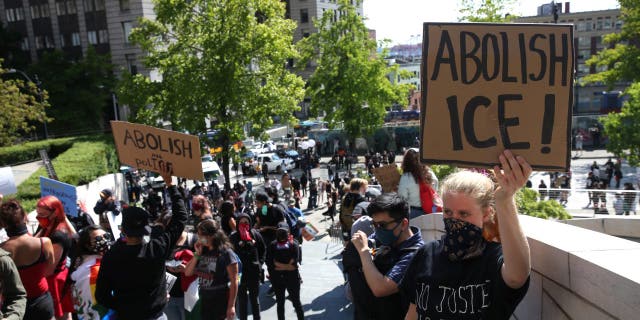
Protesters calling for the end of ICE rally outside City Hall on July 12, 2020, in Seattle. (Karen Ducey/Getty Images)
Edlow, also a former ICE attorney, called for a “return to the integrity of the laws and push back against the vilification of ICE’s mission and its agents.”
“NICE will add a narrative to the immigration debate that is largely ignored, and will seek to ensure that the American people can rely on justice, protection and fairness in the immigration system,” he said.
Fabbricatore, who served at the agency for more than two decades, praised the commitment of those who work at ICE “to protect their communities and the entire nation.”
“While politicians with questionable priorities created hot button issues around the immigration process, those of us in immigration enforcement continued to respond daily to illegal immigration, human smuggling, sex and drug trafficking, gang violence, and many other crimes. With what is happening at the border and gutting of enforcement in the interior of the country, it is time to strengthen our resolve and enforce the law as it is written,” he said. “The citizens of this country deserve it and the lingering excuses for inaction are no longer acceptable.”
The organization comes with a slew of policy priorities related to enforcement, including calling for the removal of those who break immigration law, punishing of repeat offenders, ending “catch-and-release policies,” mandatory E-Verify, and greater cooperation with state and local enforcement.
The group also calls for the end of what it says are illegal “sanctuary cities.” Such jurisdictions forbid or limit law enforcement cooperation with ICE detainers – which are requests that a law enforcement agency notify ICE before releasing an illegal immigrant in their custody.
Proponents of sanctuary laws argue that they encourage cooperation from otherwise law-abiding illegal immigrants, but opponents argue that it leads to the release of illegal immigrant criminals who could otherwise be deported back onto the streets. Sanctuary cities have become a hot political issue in the last year after Texas Gov. Greg Abbott began busing migrants to sanctuary cities across the country – including Washington, D.C., New York City and Chicago.
Illegal immigration, meanwhile, is likely to remain a hot-button issue in the coming months. The Biden administration is still dealing with a border crisis that is now into its third year, and has been highlighting the removal flights it has been conducting since the end of Title 42 last month. Additionally, both border security and interior immigration enforcement are likely to be key issues in the 2024 presidential campaign.

Politics
Former Wisconsin Democratic Rep. Peter Barca launches congressional comeback bid
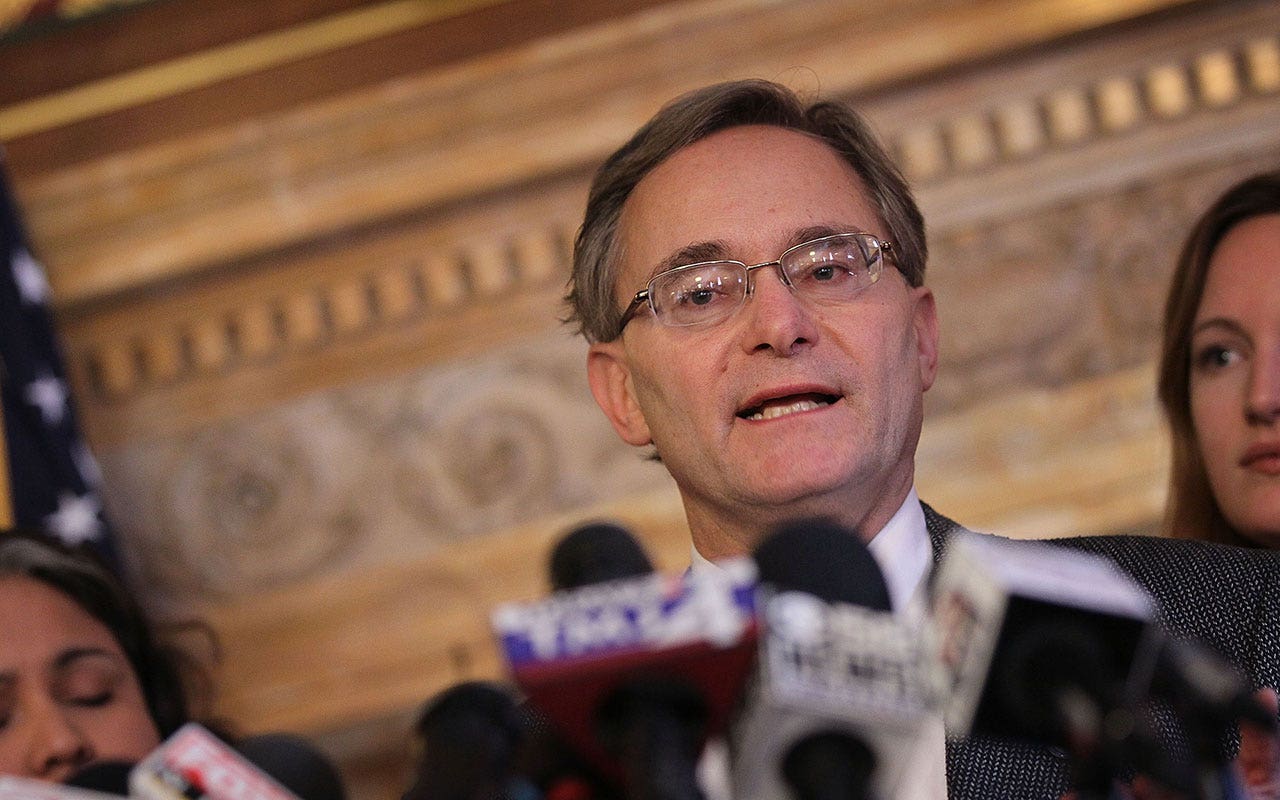
- Peter Barca, a former Democratic congressman from southeast Wisconsin in the 1990s, announced his candidacy for Congress against Republican incumbent Bryan Steil, who seeks a fourth term.
- Wisconsin’s 1st Congressional District, previously held by Paul Ryan, has become more competitive after new boundary lines were adopted in 2022.
- Barca’s political history includes previous terms in Congress and leadership roles in the state Assembly.
A Democrat who represented southeast Wisconsin in Congress in the 1990s before going on to become a leader in the Assembly and state revenue secretary announced Thursday that he’s running for Congress again.
Peter Barca announced his bid against Republican U.S. Rep. Bryan Steil, who is seeking a fourth term. Wisconsin’s 1st Congressional District, previously represented by former House Speaker Paul Ryan, leans Republican but was made more competitive under new boundary lines adopted in 2022.
The seat is a target for Democrats nationally as they attempt to regain majority control of the House. It is one of only two congressional districts in Wisconsin that are viewed as competitive. The other is western Wisconsin’s 3rd Congressional District held by Republican U.S. Rep. Derrick Van Orden.
WISCONSIN SUPREME COURT JUSTICES QUESTION HOW MUCH POWER LEGISLATURE SHOULD HAVE
Republicans hold six of Wisconsin’s eight congressional seats.
Wisconsin State Assembly Democratic Leader Peter Barca speaks to the press in the state capitol building on Feb. 25, 2011, in Madison, Wisconsin. Barca, who represented southeast Wisconsin in Congress in the 1990s before going on to become a leader in the Assembly and state revenue secretary, has announced that he is running for Congress again. (Scott Olson/Getty Images)
Barca, 68, previously held the 1st Congressional District seat from 1993 to 1995. He had previously considered running again for the seat after Ryan stepped down in 2018.
Barca is the first well-known Democrat to get into the race. National Democrats are expected to back Barca’s campaign. The primary is Aug. 13.
Barca, in a statement announcing his campaign, said his long record of public service showed that he was a fighter for working families and contrasted himself with a “do-nothing, dysfunctional Congress.”
“We need someone to step up and start going to bat for our families again,” he said.
The Steil campaign said in a statement that Barca has “put his political career ahead of Wisconsin families” over the past 40 years. The campaign also faulted Barca for opposing a 2016 bill that would have banned sanctuary cities and for voting in 1993 for a budget bill in Congress that raised the gas tax.
National Republican Congressional Committee spokesperson Mike Marinella branded Barca as a “sacrificial lamb” who has “put his out of touch policies ahead of Wisconsinites.”
Steil was elected in 2018 by 12 percentage points, and won reelection by 19 points in 2020 and 9 points in 2022.
Barca was elected to serve in the state Assembly from 1985 until 1993 when he resigned after winning a special election to Congress. After he lost in 1995, former President Bill Clinton appointed him to serve as Midwest regional administrator to the U.S. Small Business Administration.
He was elected again to the Assembly in 2008 and served as Democratic minority leader from 2011 to 2017.
Barca was leader of Democrats in 2011 during the fight over collective bargaining rights. While his Democratic colleagues in the Senate fled to Illinois in an attempt to block passage of a bill that effectively ended collective bargaining for public workers, Barca helped organize a filibuster in the Assembly that lasted more than 60 hours.
Barca stepped down as minority leader, in part over grumbling from fellow Democrats over his support for a $3 billion incentive package for Foxconn, the Taiwanese manufacturing company that had planned to locate a massive facility in his district.
Barca left the Assembly in 2019 when Gov. Tony Evers tapped him to be secretary of the state Department of Revenue. He resigned last month.
Politics
Newsom calls for increased oversight of local homelessness efforts
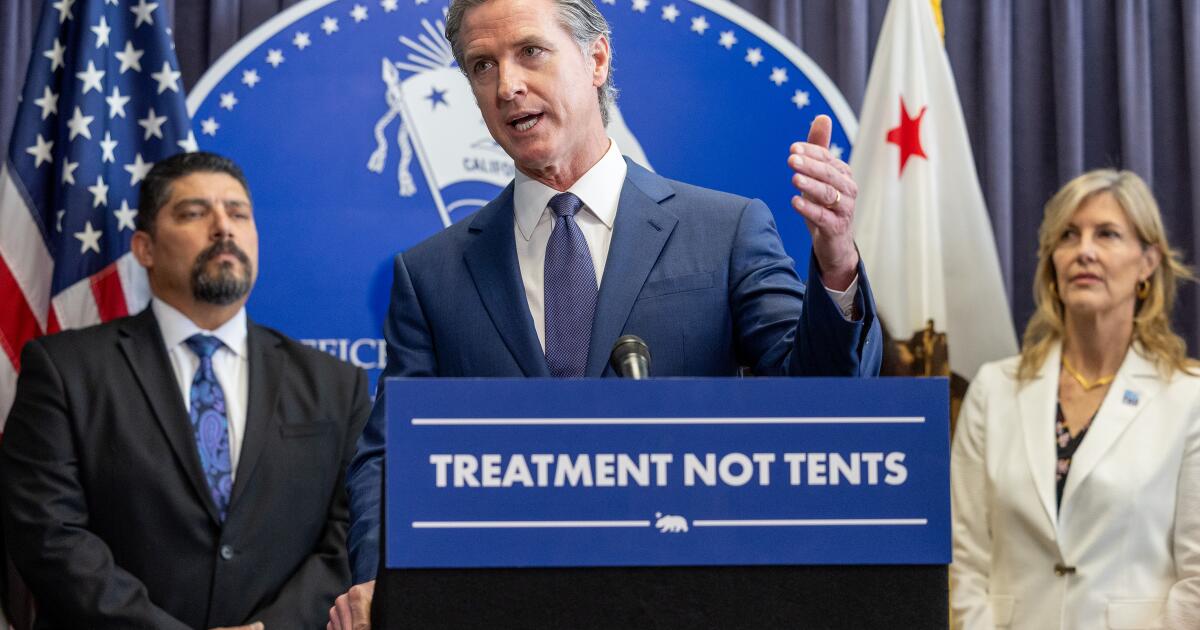
Frustrated over the lack of progress on homelessness in California, Gov. Gavin Newsom is calling for increased oversight of cities and counties that receive state funds in an effort to hold them accountable to deliver results.
Newsom’s more aggressive stance is the latest example of the governor wanting local governments to do more to lessen homelessness, which has worsened in his tenure despite more than $20 billion in state funds spent on programs to help over the last five years.
The governor’s plan seeks to expand a unit that was created in 2021 within the Department of Housing and Community Development to enforce local compliance with state housing law. The unit’s work has resulted in Atty. Gen. Rob Bonta filing lawsuits against cities, such as Huntington Beach, for refusing to build enough homes.
“Local governments have told us that they have plans to reduce unsheltered homelessness,” said Jason Elliott, Newsom’s deputy chief of staff. “They’ve written that down, and they’ve signed on the dotted line. This reform is about making sure that those promises get fulfilled.”
The proposal would broaden the responsibilities of the Housing Accountability Unit to include oversight of state homelessness grants to cities and counties and whether local governments follow through on their plans to reduce unhoused populations and adhere to state laws. Through the state budget process, the proposal seeks to shift nearly two dozen staff members into the unit to focus on local homelessness oversight and enforcement.
Newsom also wants lawmakers to pass legislation that would, beginning in 2027, in effect require jurisdictions to zone housing for homeless populations and give the state another avenue to hold local governments accountable for reducing homelessness.
The changes “create a pathway for jurisdictions to actually be responsive to that lower income category,” said Tomiquia Moss, secretary of the Business, Consumer Services and Housing Agency. “The zero to 30% area median income, which many of the folks who are unhoused fit within, has not had a housing requirement to it.”
Newsom’s plan is likely to receive support from advocates for the homeless and elicit concerns among some local governments about enforcement. His effort to punish cities and counties for not approving enough housing has drawn a mixed bag of reactions over the years, including concerns about the state infringing on the rights of local government.
The effort follows a report from the California state auditor’s office that found the Newsom administration failed to track and evaluate the effectiveness of billions of dollars spent on its own programs. Elliott said the state does not have enough data to determine the efficiency of its homelessness programs and added “we’re really not getting information from local governments about whether or not they’re executing on their obligations.”
Expanding accountability, Elliott said, will hold local governments responsible for delivering solutions and tracking performance in exchange for billions in state funding.
The proposal marks a new effort by Newsom to address homelessness, a pernicious problem in California tied to a shortage of housing, the high cost of living and a drug abuse and mental health crisis. At last count, the state’s homeless population stood at 181,000.
Newsom has highlighted homelessness as the top policy priority of his governorship, and in doing so, also made the issue his greatest political vulnerability. Fox News and conservative politicians repeatedly draw on the image of encampments lining California sidewalks as an example of his failures as governor and as a rebuke of Democratic leadership.
The governor is acutely aware of the criticism and sends pictures to his aides of encampments from his travels throughout the state as a reminder that they all can do better.
Newsom has repeatedly criticized local governments for not taking a more aggressive stance to address homelessness and mental health needs in their communities as he takes on progressives in his own party by employing a more moderate approach to the problem than on any other policy issue.
Eager to make progress, the governor successfully advocated for changes to the law to permit compelling people with severe mental illness and substance disorders into care. He recently referred to the narrow passage Proposition 1, his March ballot measure to boost funding and treatment beds for mental health, as an example of voters feeling cynical about the idea that more money would solve the problem.
“The results are not what any of us want them to be,” Elliott said. “Walk down any street in any major or small city in California and you know exactly what I’m talking about. So, this is really about homelessness spending and accountability and accountability for the actions that local governments are required to take.”
Politics
Trump trial: Jury selection to resume in New York City for 3rd day in former president's trial

Jury selection in former President Trump’s historic and unprecedented criminal trial stemming from charges brought by Manhattan District Attorney Alvin Bragg is expected to resume Thursday morning.
Bragg has charged Trump, the 2024 presumptive Republican presidential nominee, with 34 counts of falsifying business records in the first degree. The charges are related to alleged hush money payments made to adult film actress Stormy Daniels ahead of the 2016 presidential election.
TRUMP SAYS CRIMINAL TRIAL IS HAVING ‘REVERSE EFFECT’ AS HE CAMPAIGNS AT NEW YORK BODEGA, VOWS TO SAVE CITY
Trump has pleaded not guilty to all counts. He has blasted the trial as pure politics, a “political persecution,” and maintains his innocence. The former president is expected to testify during his trial.
Former President Trump is shown before proceedings get underway on the second day of jury selection at Manhattan Criminal Court in New York City on April 16, 2024. (AP Photo/Mary Altaffer/Pool)
“I tell the truth,” Trump said last week, when asked about his possible testimony.
Trump is the first president in United States history to stand criminal trial.
By the end of jury selection on Tuesday, seven jurors had been selected and sworn in. The jury pool so far includes four men and three women, all living in New York City. Their professions include law, finance, nursing, technology and more.
Court will not meet for the trial on Wednesdays, and the third day of jury selection is expected to begin at 9:30 a.m. in Lower Manhattan.
Tuesday, the second day of the trial, brought a filing from Bragg, who argued that Trump should be held in contempt of court for violating the gag order imposed upon him by Judge Juan Merchan, who is presiding over the trial.
Bragg and prosecutors are arguing that Trump must pay a $1,000 fine each for three alleged violations of the gag order, with all relating to social media posts.
TRUMP HUSH MONEY TRIAL: MEET THE JURORS WHO WILL HEAR BRAGG’S CASE AGAINST THE 2024 PRESIDENTIAL CANDIDATE
In the motion, Bragg urged the judge to warn Trump that “future violations” of the gag order can be punished “not only with additional fines, but also with a term of incarceration of up to thirty days.”
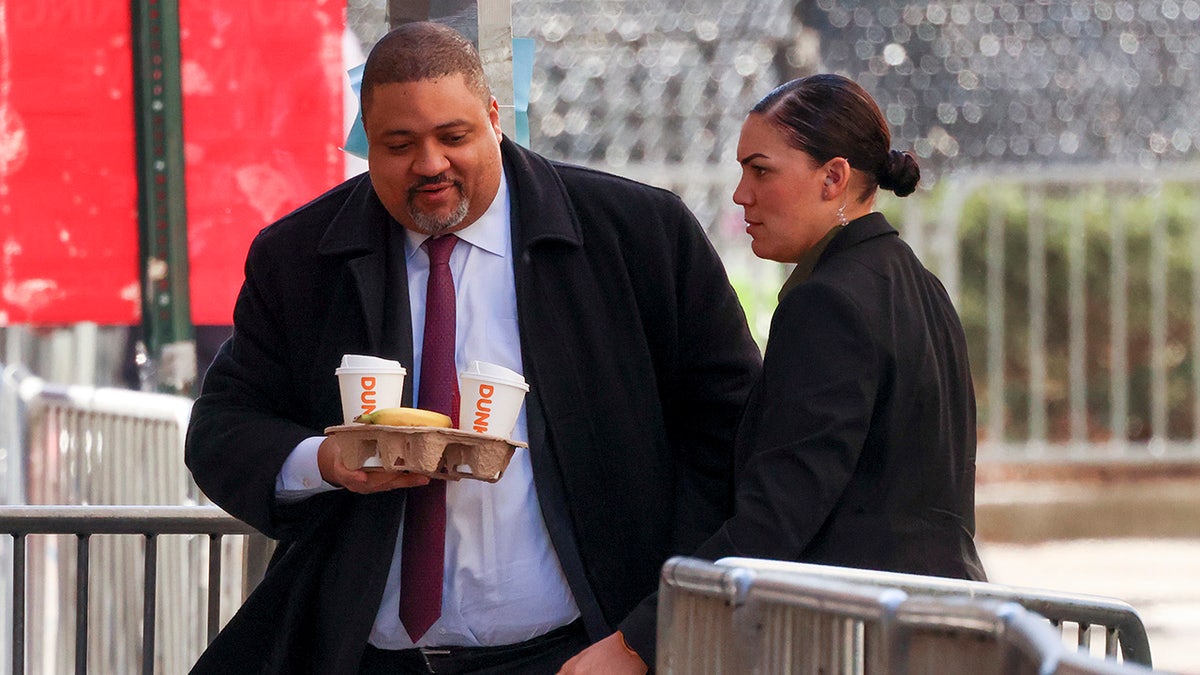
Manhattan District Attorney Alvin Bragg arrives at Manhattan Criminal Court in New York City on April 16, 2024. (AP Photo/Yuki Iwamura)
But after sitting in a courtroom for more than eight hours of jury selection Tuesday evening, Trump made a campaign stop at Sanaa Convenience Store in Harlem. Trump was met by a large crowd chanting “Trump, Trump, Trump,” “Four more years” and “We love Trump.” The crowd was singing the national anthem.
The visit was intended to highlight rising crime in New York City under Bragg’s watch.
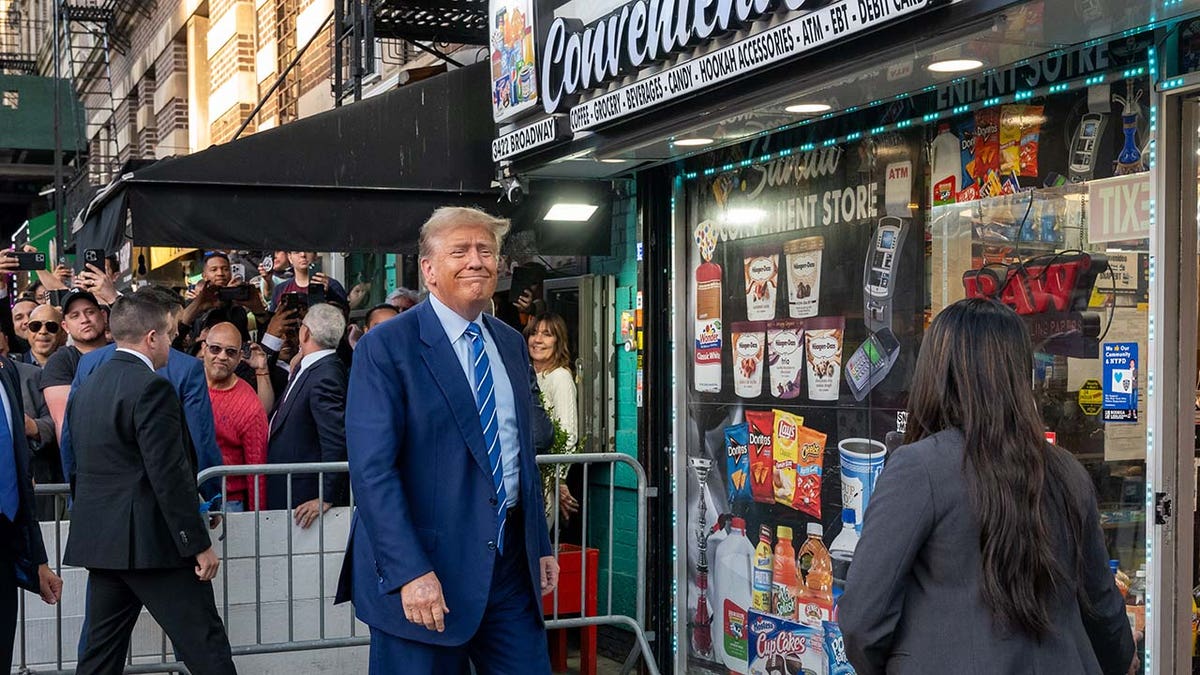
Former President Trump visits a Manhattan bodega – where a worker was assaulted by a man in 2022 and ended up killing him in an ensuing fight – on April 16, 2024, in New York City. Trump visited the bodega after spending a second day in court where he faces 34 felony counts of falsifying business records in the first of his criminal cases to go to trial. (Spencer Platt/Getty Images)
Trump blasted the trial and charges against him, saying it is “rigged,” “all politics” and “coming out of the [President Biden’s] White House.”
“It makes me campaign locally, and that’s OK,” Trump said. “We’re doing better now than we’ve ever done, so I think it’s having a reverse effect.”
BRAGG FILES MOTION TO HOLD TRUMP IN CONTEMPT FOR ALLEGED GAG ORDER VIOLATIONS, THREATENS 30 DAYS OF JAIL TIME
“We’re going to come in – No. 1, you have to stop crime, and we’re going to let the police do their job. They have to be given back their authority. They have to be able to do their job,” Trump said. “And we’re going to come into New York. We’re making a big play for New York, other cities, too. But this city, I love this city.”
Trump said New York has “gotten so bad in the last three years, four years.”
“And we’re going to straighten New York out. So, running for president, we’re putting a big hit in New York; we could win New York,” he said.
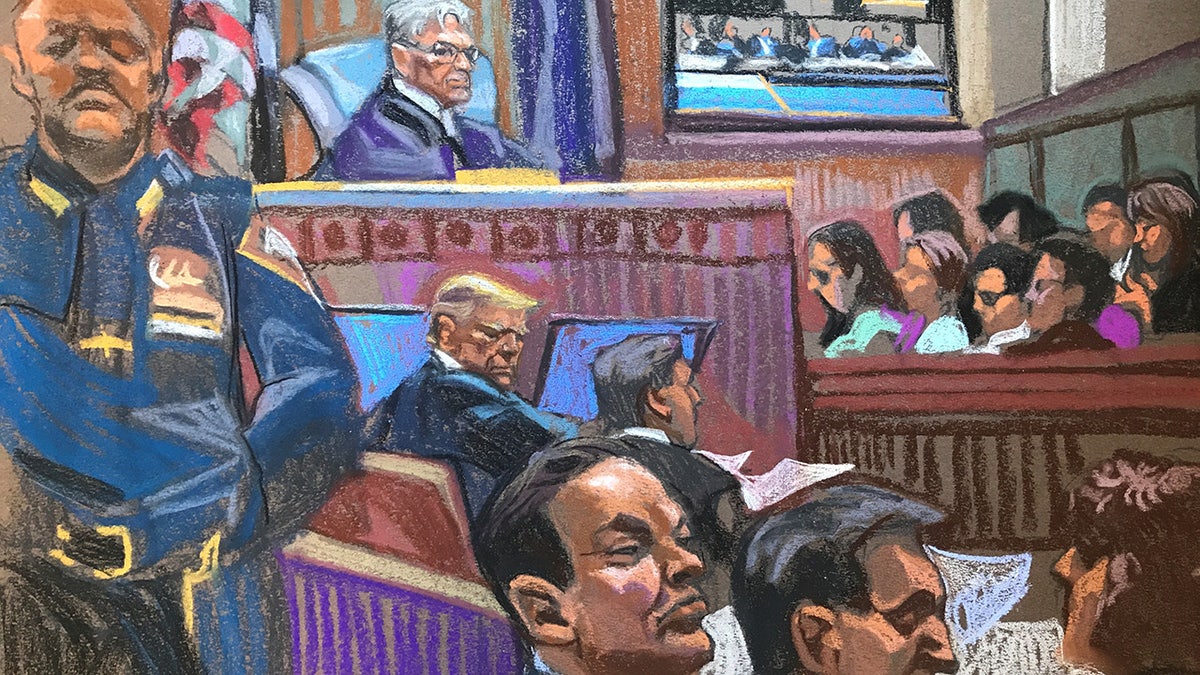
A court sketch depicts the second day of former President Trump’s criminal trial in Manhattan Criminal Court on April 16, 2024. Jury selection in his hush money trial is ongoing. (Christine Cornell)
“They want to keep me off the campaign trail,” Trump said. “But based on what I’m doing, I think there’s more press here than if I went out to some [other] location.”
As for crime in New York City, Trump said, “It’s Alvin Bragg’s fault. Alvin Bragg does nothing. He goes after guys like Trump who did nothing wrong. Violent criminals, murderers? They know there are … hundreds of murders all over the city. They know who they are. They don’t pick them up. They go after Trump.”
He added, “The people of New York are not going to take it. That’s why they’re going to vote for Trump.”
-

 News1 week ago
News1 week agoVideo: Election Officials Continue To Face Violent Threats
-

 World1 week ago
World1 week agoHope and anger in Gaza as talks to stop Israel’s war reconvene
-

 Movie Reviews1 week ago
Movie Reviews1 week agoSasquatch Sunset (2024) – Movie Review
-

 Science1 week ago
Science1 week agoThe Eclipse Across North America
-
Fitness1 week ago
This exercise has a huge effect on our health and longevity, but many of us ignore it
-
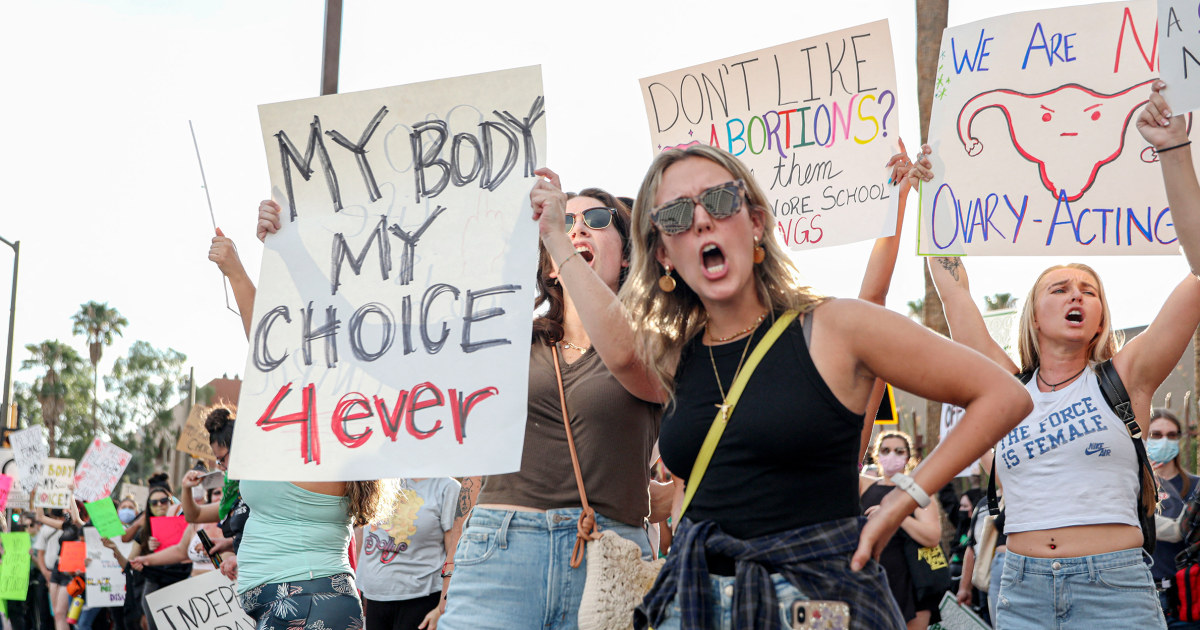
 News1 week ago
News1 week agoArizona Supreme Court rules that a near-total abortion ban from 1864 is enforceable
-

 Uncategorized1 week ago
Uncategorized1 week agoANRABESS Women’s Casual Loose Sleeveless Jumpsuits Adjustbale Spaghetti Strap V Neck Harem Long Pants Overalls with Pockets
-

 Finance1 week ago
Finance1 week agoSponsored: Six Ways to Use Robinhood for Investing, Retirement Planning and More




